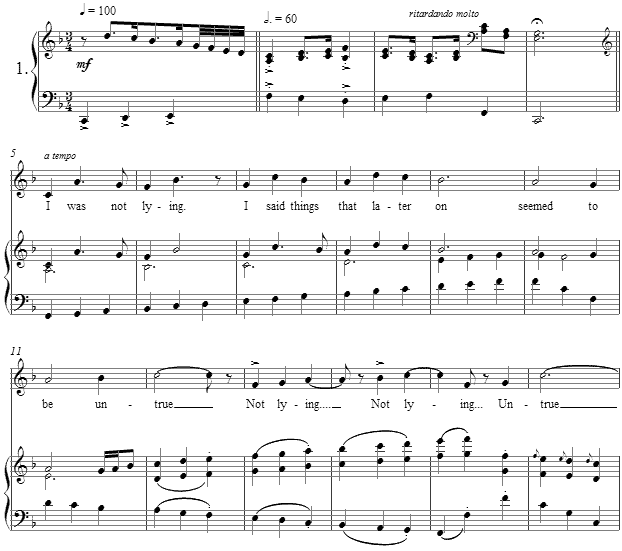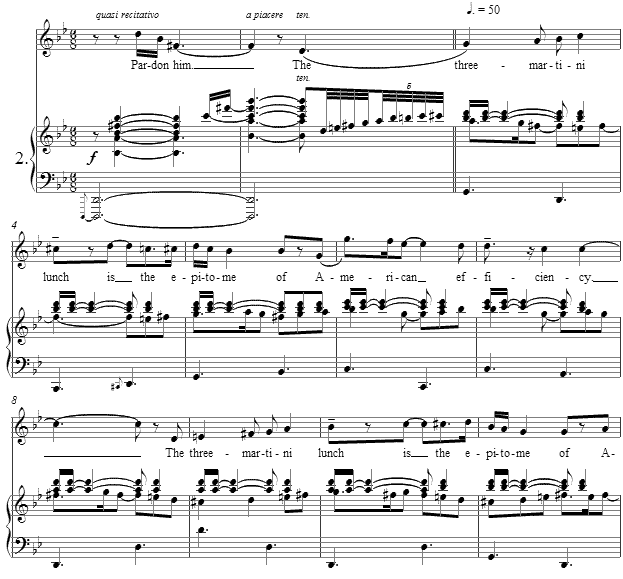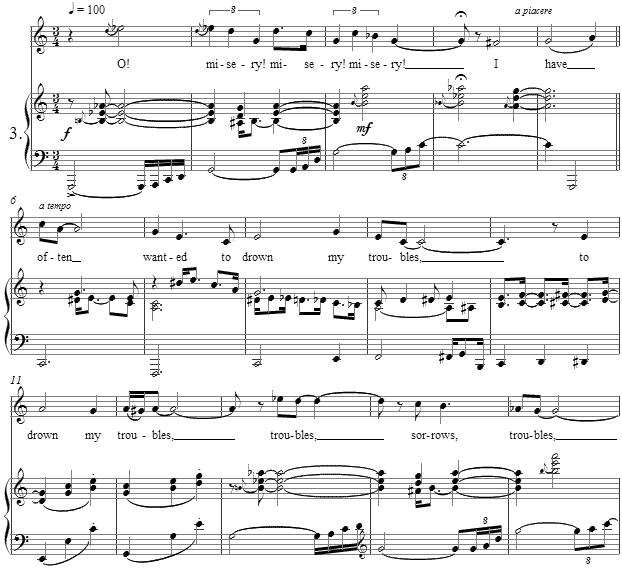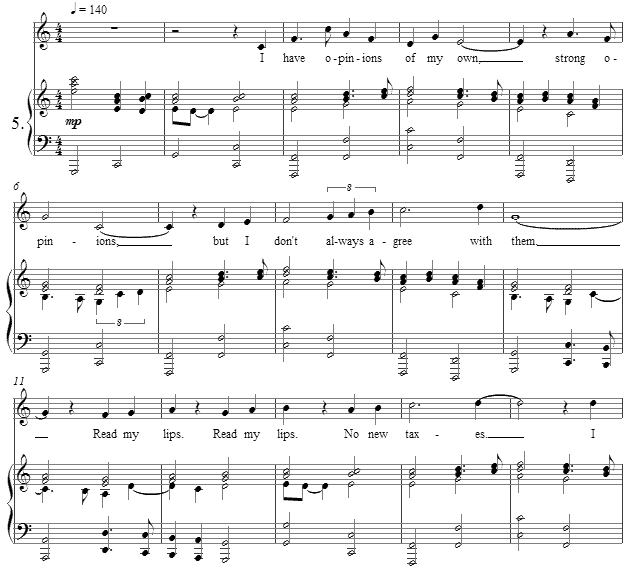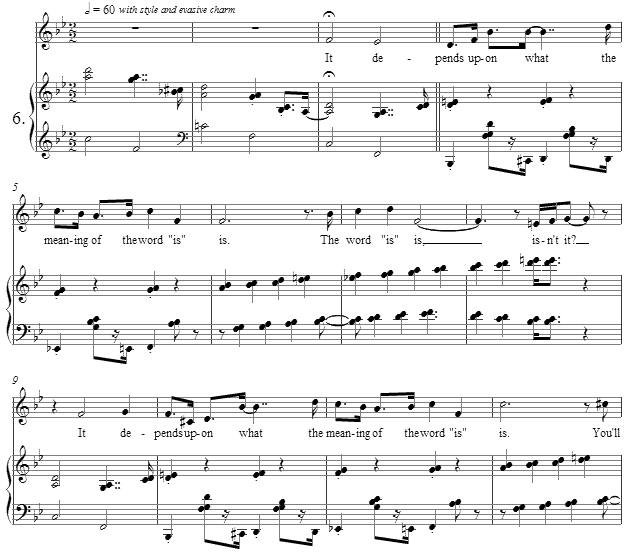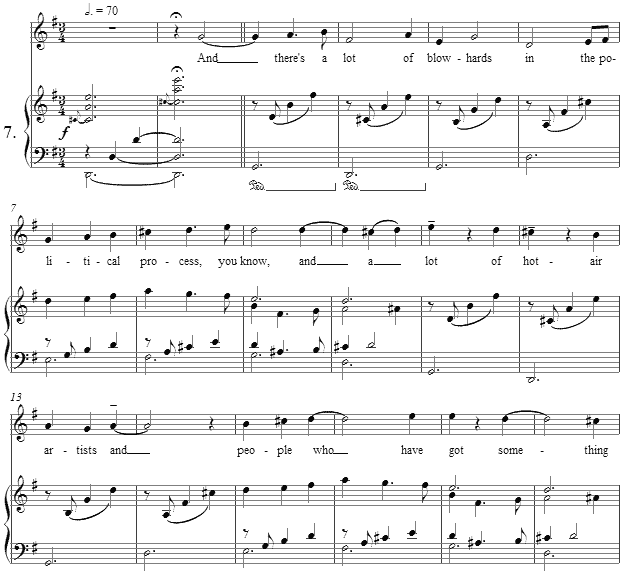Music and Texts of GARY BACHLUND
Vocal Music | Piano | Organ | Chamber Music | Orchestral | Articles and Commentary | Poems and Stories | Miscellany | FAQs
Seven Presidential Pardons - (2007)
After texts in the public domain from seven U.S. Presidents
for high or medium voice and piano
i. I'm not a Crook - Richard Milhouse Nixon (1913-1994) [ 5 pages, circa 2' 00" ]
I was not lying.
I said things that later on seemed to be untrue.
People have got to know whether or not their President is a crook.
Well, I'm not a crook.
I've earned everything I've got.
When the President does it,
that means that it's not illegal.
I would have made a good Pope.
Lie, lie, lie, lie, not lying!
ii. American Efficiency - Gerald Rudolph Ford. Jr. (1913-2006) [ 2 pages, circa 1' 30" ]
Pardon him.The three-martini lunch is the epitome of American efficiency.
Oh, pardon me, but...Where else can you get an earful,
a bellyful and
a snootful at the same time?Pardon me.
iii. To drown my troubles - James Earl Carter (b. 1924) [ 5 pages, circa 3' 05" ]
Oh! misery!
I have often wanted to drown my troubles,
but I can't get my wife to go swimming.
To drown my sorrows... Misery!
We've uncovered some embarrassing ancestors
in the not-too-distant past.
Some horse thieves, and some people killed on Saturday nights.
One of my relatives, unfortunately,
was even in the newspaper business.
O! misery!I have looked on a lot of women with lust in my heart.
I've committed adultery in my heart many times....
I have often wanted to drown my troubles,
but I can't get my wife to go swimming.
Adultery! Misery!
Pardon me!
iv. The Second-oldest Profession - Ronald Wilson Reagan (1911-2004) [ 4 pages, circa 2' 15" ]
Well, Gerald Ford was a Communist -
pardon me - a Congressman....
Facts are stupid things.Politics is supposed to be the second-oldest profession.
I have come to realize that it bearsa very close resemblance to the first.
Facts are stupid things.
v. No Exaggeration George Herbert Walker Bush (b. 1924) [ 3 pages, circa 1' 50" ]
I have opinions of my own - strong opinions -
but I don't always agree with them.Read my lips - no new taxes!
It's no exaggeration to say that
the undecideds could go one way or another.I have opinions of my own - no new taxes -
but I don't always agree with them.
No new taxes!
vi. It depends upon what the meaning of the word 'is' is - William Jefferson Clinton (b. 1946) [ 3 pages, circa 1' 50" ]
It depends upon what the meaning of the word 'is' is.
The word 'is' is, isn't it?
It depends upon what the meaning of the word 'is' is.
The word 'is' is.Pardon me!
If 'is' means 'is and never has been,'
that's one thing.
If it means 'there is none,'
that was a completely true statement.
The word 'is' is, isn't it?
Is it? Isn't it? It is! It depends.
vii. The Strategery - George W. Bush (b. 1946) [ 5 pages, circa 1' 50" ]
And...There's a lot of blowhards in the political process, you know,
and a lot of hot-air artists,
and people who have got something fancy to say.
And there is distrust in Washington.
And I am surprised, frankly, at the amount of distrust that exists in this town.
And I'm sorry it's the case,
and I'll work hard to try to elevate it.
And a dangerous plan is better than no plan at all.
I'll work hard to try to elevate it.
I'll work hard to try to elevate...
distrust in Washington.
After all, I know the human being and fish can co-exist peacefully.
Honestly! Pardon me!
[ Total duration - 27 pages, circa 14' 20" ]
U.S. Presidents Richard Nixon, Gerald Ford, Jimmy Carter, Ronald Reagan, George H. W. Bush, Bill Clinton, and George W. Bush
Democracy is two wolves and a lamb voting on what to have for lunch. Liberty is a well-armed lamb contesting the vote. -- Benjamin Franklin, 1759
With this marvelous quote by American Benjamin Franklin when the United States democracy was a fledgling political and liberty was threatened, I think often on the course which American politics takes, strident in tone and aggressively invested in polar opposites. I have seen in my own life some of the above presidents seen by their political opponents as un-American or illegally elected, and find such harsh political polarities dishonest and ultimately false. What is certain is that all the above presidents have been human beings with their own human faults, and some of these faults have been cemented by their public gaffes, their errors in judgment, and their own words have often become their own worst enemies. Certainly, a good humored revisit to the misspoken, inept and simply goofy is in order. Herein therefore I offer some reflections on these men and their own words edited slightly for the sheer fun of it. Each president has had and shown well his own proverbial "clay feet," as do we all from time to time.
What is clear, editorially, is that I side with liberty -- that lamb which opposing wolves hunger to exploit. That is one role of the artist, who is most assuredly more like any lamb than any wolf. It is in the nature of man, suggested authors Norman Mailer and Doris Lessing most recently, to seek to control others; this is of course not the process and conduct of art for which liberty is a necessity. Noticing this salient fact and enthusiasm for liberty never disturbs a lamb, but always angers a wolf ready the dine on the lamb. Let us reflect on this truth as we chuckle at the expense of some legendary men.
Among recent quotes come those of William Jefferson Clinton (1946-), after the testimony of August 17, 1998, and George W. Bush (1946-), in Washington, D.C., May 17, 2007 and on National Public Radio, Jan. 29, 2007, for many publishers now highlight the gaffes and speech errors which we find amusing. That all the presidents have made such gaffes and more teaches an important lesson about media exposure and the simple pressures of the office itself and its demands. Who has not said something silly? We all have, but from president to president, the nation has moved forward and prospered. The brilliance of the American political system since its inception, born in a violent revolution and bettered through its many troubles, is that leadership is transitory and the individuals who have led the nation voluntarily step down from power under the rules of the Constitution. We share this feature of government now with many Western nations, wherein power is handed from leadership to leadership in a civil and orderly fashion. This is the future of the remainder of the world's nations, still under despotism of one sort or another.
tessitura for high voice
I chose to begin this cycle with the presidential pardon of Richard Nixon by Gerald Ford, and from it and other apologies for gaffes comes the cycle's title. A short quote from "Hail to the Chief" introduces this jaunty 3/4 time song, accompanied by parallel diatonic sevenths, dissonances within the consonance of the whole which remains staunchly in a major tonality throughout.
The very silly comment by Gerald Ford is set in 6/8 time, and begins with a recitative-like "pardon," as it was Ford who pardoned Richard Nixon, thereby relieving him of the embarrassment of potential prosecution. That a "three-martini lunch" epitomizes American efficiency is laughable, of course, and meant as a joke. An "earful," a "bellyful" and a "snootful" make for a fine image of gluttony, and this setting echoes the triple time gestures of burlesque theater.
President Carter set his campaign to create a "misery index" which faulted the leadership of President Ford, and in part as a result of this "misery," Carter defeated Ford in the election. Ironically this same "misery index" was used against Carter as he lost in the next election. Therefore I mixed musical images of "misery" with blue notes and chromaticism, and comingled this with a gentle 3/4 country feel to the major tonic of the song's central theme. President Carter gave an Interview to Playboy Magazine in which he confessed his "lust," which became a joke of sorts. I mingle the "misery" with his joke about his "troubles," for indeed something about these "troubles" had its own personal reality for the man.
President Reagan echoed something humorously which President Kennedy (1917-1963) also had commented on, "Mothers all want their sons to grow up to be President, but they don't want them to become politicians in the process." Politics has a poor reputation, with good reason many believe. This was as true a century ago, for politics is both necessary and annoying at the same time. As Reagan demonstrated his own verbal gaffes, I chose to meld one of these with his observation about the second oldest profession being quite alike unto the first oldest profession -- prostitution. The 12/8 swing and strut tempo seemed apt for this presidential observation.
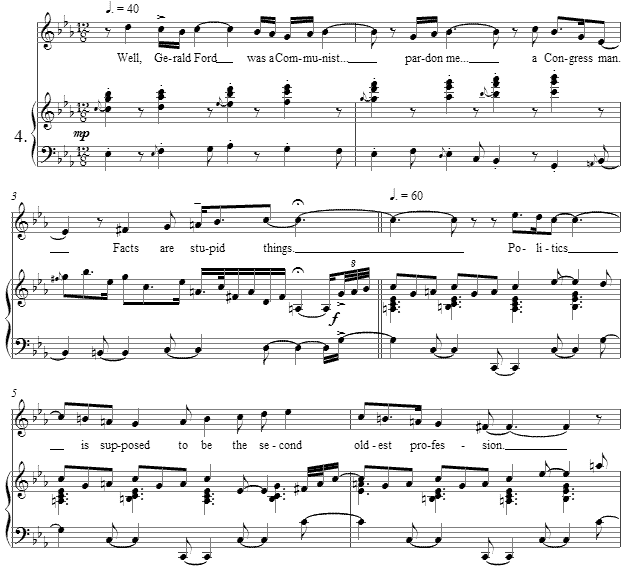
Reagan was followed by his Vice-President, who introduced what has become termed Bushisms -- verbal gaffes -- though one finds them in each president, reading far back into history. President Bush's famous "read my lips" cost him the election, in my opinion, as he changed his opinions. The text I chose shows this clearly, and the setting therefore remains most unsettlingly not within its tonic major key, as the expected sub-dominant scale tone -- B flat in F major -- which would allow clear subdominant and dominant seven chords is avoided throughout, an evasion within a frame of musical reference to mimic the evasion which is "politics practiced." How this functions is simple; the song setting was always to end in C major, though evasion of that tonal conclusion was the purpose of the harmonic progressions. Hiding a quote from "Hail to the Chief" grounded on F was one of the ways to see this so.
The elder Bush lost his election to the charming President Clinton, who himself fell into so many gaffes. Central to that ridicule of his presidency was his "exploits" which I chose to ignore, per se. Rather I chose to set his tortured verbal argument about the "meaning of the word 'is' is." It is set in a jaunty, dotted rhythm and seemingly flippant accompaniment, treating lightly what was certainly something not to be so treated. The setting vacillates between a duple metered, popular-styled accompaniment figure and then simple, dissonant seconds to break away, only to return again to the more flippant musical gestures.
The second President Bush has become literally renown for his verbal confusion and odd choices of mixed metaphors. What struck me in looking through many of the more well-known gaffes was his habit or running sentences together with the preposition, "and." Therefore I run together some of his quotes, and even begin the text with "and." The setting is an odd waltz, quite tonal at the onset but with non-tonal accidentals wandering off, only to be brought back in strophic fashion to the waltz motive itself. Each little strophe begins with a secondary dominant over the dominant and a tenuto -- A major over D -- while the vocal line insists on the tonic -- G -- to begin before the tonic chord takes up the waltz' musical "sentence." This insistence of beginning with the tonic against the cadential figure's harmonic content surrounding the dominant and sub-dominant is a recurring signature of the several strophes.
I add a postscript to this short commentary in part by citing the United States Supreme Court’s decision in West Virginia State Board of Education versus Barnette (1943). Writing for the Court, Justice Robert H. Jackson stated, “If there is any fixed star in our constitutional constellation, it is that no official, high or petty, can prescribe what shall be orthodox in politics, nationalism, religion, or other matters of opinion or force citizens to confess by word or act their faith therein.” This is the radical idea of the seemingly turbulent American system in a nutshell.
Each president, ignoring the silly politics which has tried to argue for partisan orthodoxies such as "stolen elections" and the like, serves at the will of a systematized democratic vote within the framework of a republican structure. Each of these men above was elected in an ultimately orderly fashion, and each served without question as President of the United States. This is the simple truth of history, not politics.
Note that both words, republican and democratic, can be used without capitalization for the United States survives and prospers through the happy confluence of democratic and republican procedures. While the surface noise of campaigns and fractional partisanship seem to be the reality of American politics, there is a larger picture -- a "fixed star," if you will, and Justice Jackson's words remind us -- in which the nation 'decapitates' its political leadership on a regular schedule and in an orderly fashion, swapping one party's candidate for another's.
Just as each of the above texts represents some rather silly gaffe of these men in the conduct of their office, their office retains its value, head and shoulders above the jokes, humor and even rancor. Let us therefore enjoy these men' words edited by me and this little glimpses into their own "clay feet," for fairly speaking so do we all have such clay feet, if only we were honest with ourselves.
The score is available as a free PDF download, though any major commercial performance or recording of the work is prohibited without prior arrangement with the composer. Click on the graphic below for this piano-vocal score.
Seven Presidential Pardons - edition for high voice
Seven Presidential Pardons - edition for low voice
There is also an addendum to this cycle of seven, in total therefore a cycle of eight: Well, we are out of money now - (2009) after public quotes of Barak Hussein Obama II.

